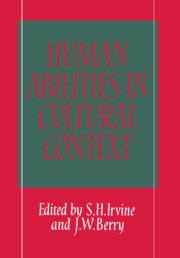Book contents
- Frontmatter
- Contents
- List of contributors
- Preface
- Acknowledgments
- Part I Human abilities in theoretical cultures
- 1 The abilities of mankind: A revaluation
- 2 A triarchic view of intelligence in cross-cultural perspective
- 3 The biological basis of intelligence
- 4 Speed of information processing and population differences
- 5 The factor model as a theoretical basis for individual differences
- 6 The meaning of item bias in ability tests
- Part II Cultural responses to ability measurement
- Part III Cultural limits upon human assessment
- Author index
- Subject index
4 - Speed of information processing and population differences
from Part I - Human abilities in theoretical cultures
Published online by Cambridge University Press: 13 January 2010
- Frontmatter
- Contents
- List of contributors
- Preface
- Acknowledgments
- Part I Human abilities in theoretical cultures
- 1 The abilities of mankind: A revaluation
- 2 A triarchic view of intelligence in cross-cultural perspective
- 3 The biological basis of intelligence
- 4 Speed of information processing and population differences
- 5 The factor model as a theoretical basis for individual differences
- 6 The meaning of item bias in ability tests
- Part II Cultural responses to ability measurement
- Part III Cultural limits upon human assessment
- Author index
- Subject index
Summary
The purpose of this chapter is to propound the potential contribution of mental chronometry to the study of abilities in cross-cultural psychology. It informs researchers in this field of some of the techniques which have already proved useful in the study of individual differences within culturally homogeneous groups.
I use the term cross-cultural to refer to populations which differ in their symbolic systems, beliefs, values, and customs, without making any assumptions concerning the degree to which such cultural differences play a causal role in the variety of ability differences observed between particular populations. That is a question for empirical research. I would reject the assumption, which seems implicit in much cross-cultural research, that all behavioural differences between culturally different groups are attributable to, and wholly explainable in terms of, their cultural differences per se. The scientifically most defensible working hypothesis, I believe, is that the study of all human differences, in mental as well as physical characteristics, should be approached from a genetic-environment interactionist position. The culture of a population and its genetic structure are most plausibly a two-way process, each shaping the other in complex ways. It is difficult to imagine how cultural differences can be properly studied except within the broad framework of behaviour-genetic analysis, if our purpose is to go beyond the merely descriptive. Description of cultural environments and objective assessment of behaviour, however, remain crucial aspects of cross-cultural research. Chronometric techniques lend themselves to the assessment of virtually all variables that fall under the heading of “mental abilities.” The choice of variables and techniques would depend upon the investigator's purpose.
- Type
- Chapter
- Information
- Human Abilities in Cultural Context , pp. 105 - 145Publisher: Cambridge University PressPrint publication year: 1988
- 7
- Cited by



